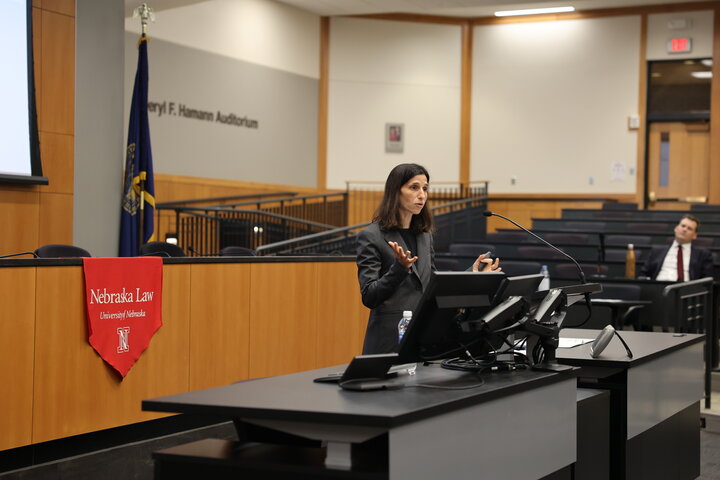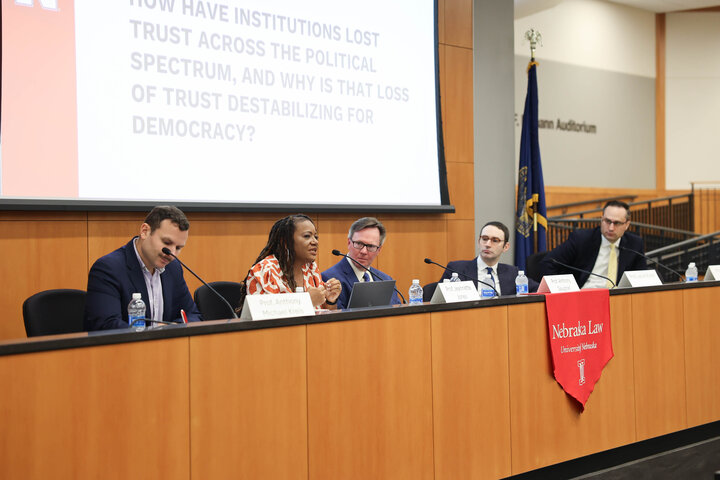The 2024 Nebraska Law Review symposium brought together faculty, researchers, attorneys and public servants to explore the ways previously stabilizing institutions moderated extremism in our democracy and how these institutions have lost the trust of large parts of the public.
University of Wisconsin Law Professor Miriam Seifter delivered the keynote address, “Trust and Democracy under State Constitutions.” Seifter identified ineffectiveness in government and lack of representation as two major driving factors of mistrust.

“Trust in government institutions contributes to the preservation of democracy itself, and very low levels of trust can do the opposite,” she said. “They can reduce turnout, they can undermine a belief that democracy is worth keeping, and they can raise the appeal of alternative types of leadership by authoritarian rulers.”
In discussing potential solutions, Seifter turned to state and local institutions. The structure of many state constitutions puts a greater emphasis on popular sovereignty, political equality and majority rule than is outlined in the federal constitution, she said.
“Of course, the malleability of state institutions can lead to bad places, bad ideas and bad outcomes, but what states offer is a sort of democratic churn that has the potential and the opportunity to energize and revitalize our beliefs of we want to collectively achieve, and what we do with that opportunity is up to us,” she said.
Throughout the day, panelists examined the role institutions have played in supporting a stable democracy, if there are solutions to rebuilding trust and the consequences of failing to do so. Experts first discussed traditional stabilizing institutions and their impact. Syracuse University College of Law Professor Jenny Breen detailed how centers of education can spread ideas on core civic principles, while Texas A&M University School of Law Professor Daniel Walters pointed to administrative agencies as an often overlooked stabilizing force.
Wayne Bena, ’03, Deputy Secretary of State for Elections, spoke on the right to vote and petition the government as cornerstones of trust. A rise of misinformation surrounding elections has put that trust at risk, he said.
“What I hope to do here in Nebraska is to be as transparent as we possibly can, be open as we possibly can and show that your vote is going to count on Election Day regardless of who you vote for,” he said.
Nebraska Law Professor Kyle Langvardt emphasized the importance of media institutions, such as local newspapers. These outlets create a basis of agreed-upon facts and public forums for discussion and political action.
“Quality journalism investigations can disclose waste, fraud, abuse and dysfunction,” he said. “Those create opportunities for democratic political institutions to respond and deliver value to the community.”
Langvardt emphasized that these institutions need resources to work at full capacity and uphold professional standards. This support could come in the form of an expanded public media presence or subsidies for private media institutions, he said.

A second panel highlighted how institutions have lost trust from both sides of the political spectrum and why that loss is destabilizing for democracy. Drake University Law School Professor Anthony Gaughan outlined various points throughout American history that marked a significant loss of trust, including the era of Jacksonian populism, the Civil War and the Great Depression. Gaughan emphasized how these moments mirror the present.
“I don’t know where this current era of political instability will lead, but I as a historian am cautiously hopeful that the outcome, though unpredictable right now, will ultimately be favorable for our country,” he said.
University of Nebraska Professor of History Jeannette Jones explained how even amid times of extreme distrust, people still sought out these systems for help.
“The most marginalized and oppressed individuals in our nation’s history often turned to those institutions for redress even as they were unsure of the outcome,” she said. “That’s where we can see this interplay between wanting to trust institutions and constantly being failed by those institutions, which then creates distrust.”
The final discussion homed in on potential solutions for rebuilding trust. Nebraska Law Professor Eric Berger suggested modest, reasonable changes such as ranked choice voting and reduced partisan gerrymandering, potentially by means of ballot initiative. There will not be much change, he said, until politicians begin to direct attention towards these efforts.
“I really do think it would be worth it for politicians to try to spread the message that one of the reasons why our system is so dysfunctional has to do with these mechanisms of our elections,” he said.
Dr. Gina Ligon, Director of the National Counterterrorism Innovation, Technology, and Education Center at the University of Nebraska- Omaha, emphasized the consequences of failing to rebuild trust. She spoke on the prevalence of domestic extremism and individuals who attempt to accelerate political conflict and violence. These actors often don’t believe in the authority of governmental institutions and look to discredit traditional power structures.
“They’re trying to attack the integrity, benevolence and ability of symbols of institutions of public trust,” she said. “They are trying to dehumanize elected officials.”
This dehumanization, she said, makes it easier for extremists to invoke violence on symbols of government.
Nebraska Law Review Symposium Editor David Earl, ’25, said the attendance of legal professionals and the wider Nebraska community spoke to the topic’s relevance.
“The Law Review knew that this topic would generate a lot of interest just two months before a consequential election,” he said. “The turnout shows a lot of people care about the trust issue with our democratic institutions.”
In closing, Nebraska Law Professor Brandon Johnson reiterated that the breakdown of trust in public institutions creates a vacuum for misinformation in which extremism can thrive. He pointed to the role of legal professionals in cultivating trust and ensuring that the law serves as a force for equity rather than division.
“When democratic institutions lose the trust of the people, they cease to serve one of their primary functions, ensuring that everyone, regardless of status or power, has a voice in shaping our democracy,” he said. “The conversations we’ve had must continue and the work must go on, but perhaps together, we can help restore trust in the very foundation of democracy and work not only to preserve but to strengthen that trust as we move toward current challenges.”